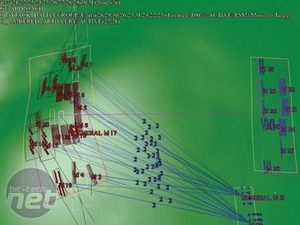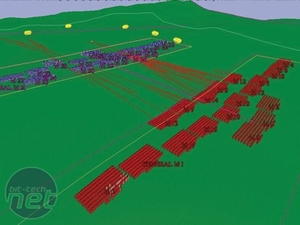AI in Games - Where Next?
AI is clearly becoming much more important in games, but it still has to compete with pretty graphics when it comes to processing resources, and it’s often at the bottom of the pile.Creative Assembly’s Richard Bull notes that "there’s still this disturbing mindset among programmers, particularly game programmers, that if the AI is taking any kind of considerable chunk of time, that’s a really bad thing. It’s only just getting to the stage now where people regard it as important enough to deserve this chunk of time in a game. If your graphics rendering is taking up 50 percent of your CPU time it’s like 'well, never mind, it looks great', but if you try to tell people that you have this really intelligent decision-making system that’s taking up 30 percent of the CPU time, they’ll say 'you obviously don’t know what you’re doing, it’s badly programmed' and so on".
However, with GPU hardware support and multithreading becoming more widespread, hopefully, we’ll see AI using a greater amount of resources. Just take a look at your CPU resources when you’re running Fallout 3 or GTA IV, and you’ll see that your CPU is being hammered. Anything that can provide game developers with more AI processing power will be warmly welcomed by the gaming industry, and we can then progress to even more sophisticated AI systems.
Creative Assembly's planning system means Empire Total War's AI analyses its resources before deciding on a goal and then working out the most efficient way of achieving it.
Where is gaming AI going in the future? Creative Assembly’s Richard Bull points that "once you’re past the state machine, you’ve got the planning system, which is the rewired state machine, then the next step is online learning". Online chatbots such as Jabberwacky and Eliza learn as a result of constant online input, and an AI system could do the same. Creative Assembly already has a similar technology in the form of a debugging system that’s used in its research and development process.
"We have this system of replays, and we have the ability to push these replays back through our AI debugging system, and we can get information from that," says Bull. "A lot of the advances in our planning system were trained by just running replays through this thing. It’s completely offline, but it would be interesting to have some kind of system where we could just get gamers to send their replays in."
With a constant online feed of battle results coming in from players using different strategies, the AI could then balance the stats and learn other strategies from human players. Creative Assembly’s Kieran Brigden enthusiastically notes that "it’s impressive watching the AI go through the debugger – you’re basically almost talking about a contained feedback neural network". Bull describes the potential as a "kind of 17th century Skynet", which could feed off loads of online data and improve considerably.

MSI MPG Velox 100R Chassis Review
October 14 2021 | 15:04












Want to comment? Please log in.